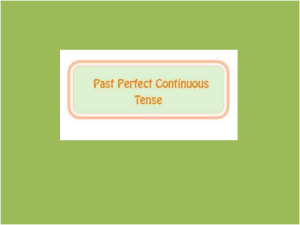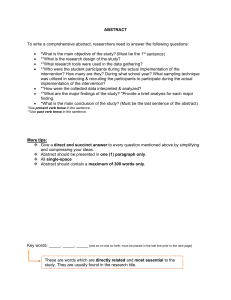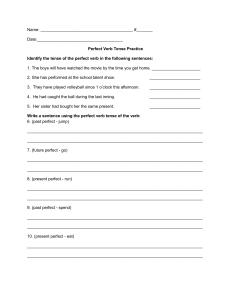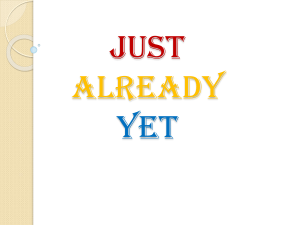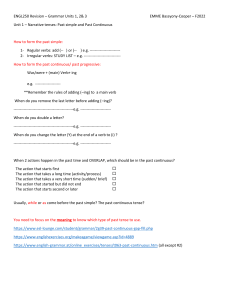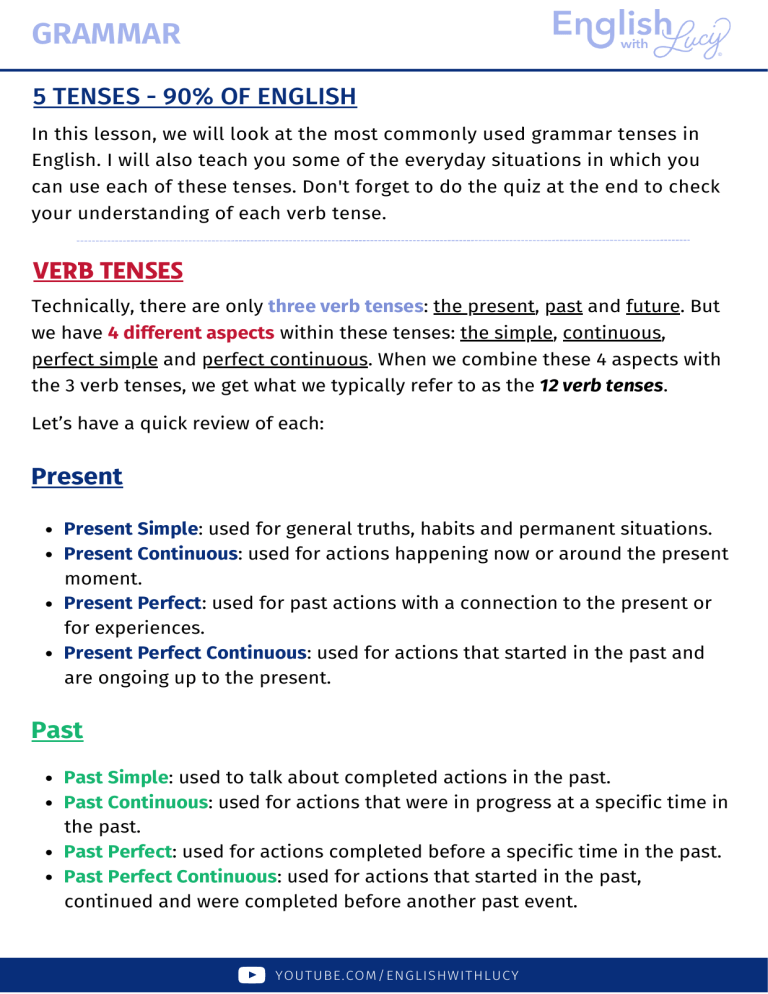
GRAMMAR © 5 TENSES - 90% OF ENGLISH In this lesson, we will look at the most commonly used grammar tenses in English. I will also teach you some of the everyday situations in which you can use each of these tenses. Don't forget to do the quiz at the end to check your understanding of each verb tense. VERB TENSES Technically, there are only three verb tenses: the present, past and future. But we have 4 different aspects within these tenses: the simple, continuous, perfect simple and perfect continuous. When we combine these 4 aspects with the 3 verb tenses, we get what we typically refer to as the 12 verb tenses. Let’s have a quick review of each: Present Present Simple: used for general truths, habits and permanent situations. Present Continuous: used for actions happening now or around the present moment. Present Perfect: used for past actions with a connection to the present or for experiences. Present Perfect Continuous: used for actions that started in the past and are ongoing up to the present. Past Past Simple: used to talk about completed actions in the past. Past Continuous: used for actions that were in progress at a specific time in the past. Past Perfect: used for actions completed before a specific time in the past. Past Perfect Continuous: used for actions that started in the past, continued and were completed before another past event. YOUTUBE.COM/ENGLISHWITHLUCY GRAMMAR © Future Future Simple: used for actions that will happen in the future. Future Continuous: used for actions that will be in progress at a specific time in the future. Future Perfect: used for actions that will be completed before a specific time in the future. Future Perfect Continuous: used for actions that will have started in the past, present or future, continue, and be completed before another future event. THE MOST COMMONLY USED TENSES PRESENT CONTINUOUS OTHER PRESENT PERFECT SIMPLE PRESENT SIMPLE FUTURE SIMPLE PAST SIMPLE YOUTUBE.COM/ENGLISHWITHLUCY GRAMMAR © As you can see in the chart, not all verb tenses are created equal. According to research, the five most common English verb tenses are— 1. 2. 3. 4. 5. The Present Simple The Past Simple The Future Simple The Present Perfect Simple The Present Continuous The small purple sliver on the chart contains the other 7 verb tenses. But don’t let this chart fool you. Each and every verb tense has its time and place, but for general, day-to-day conversations, these five are going to be your bread and butter. Now let’s go ahead and see how you can start using each of these tenses to the best of your ability. THE PRESENT SIMPLE As you just learnt, the Present Simple makes up a large portion of daily communication, and rightfully so. Let’s look at some of the most common uses of the Present Simple. 1. To talk about facts and statements that are always true Most people prefer to shop online. The supermarket is busy on Saturday mornings. 2. Statements that are true in the present You are my best friend, Jasmine! I can’t bake to save my life — look at this cake! 3. Routine actions or habits in the present, often used with an adverb of frequency. Do you always bike to work? YOUTUBE.COM/ENGLISHWITHLUCY GRAMMAR © I never see her in yoga class these days. 4. To refer to scheduled events in the future Carmine’s holiday officially starts on the 5th of October. My stag do kicks off at 10pm at Boots and Brews! 5. To give directions or instructions Mix the flour and water together to create a thick paste. To get to the bookshop, walk down to the corner and take a left. As you can probably tell from our examples, these kinds of statements and questions make up a large portion of our daily conversations. THE PAST SIMPLE The Past Simple is the second most used verb tense because we use it to talk about completed actions in the past, and we love to talk about the past. Look at a news article or pick up your favourite book; most of them rely heavily on the Past Simple tense. The Past Simple is commonly used to: 1. Describe actions that occurred at a specific time in the past. I visited Greece last summer with my girlfriend. 2. Narrate a series of past events Yolanda woke up, brushed her teeth and headed off to the office. 3. Express habitual or repeated actions in the past Every morning, Ben watered his plants and fed his dog. 4. Discuss past states or conditions We were so tired after our long hike yesterday. YOUTUBE.COM/ENGLISHWITHLUCY GRAMMAR © THE FUTURE SIMPLE The Future Simple tense allows us to talk about what's going to happen at a time after the present moment. It's used as a way to predict outcomes, express intentions, make plans and talk about expectations. The Future Simple tense is pretty straightforward as it only uses ‘will’ and the base form of a verb. It is commonly used when talking about spontaneous decisions, predictions, promises, offers or requests. 1. spontaneous decisions: I’m pretty hungry; I will order some food. 2. predictions: The weather forecast says it will rain tomorrow. 3. promises: I will get to the office 20 minutes early to get everything set up. 4. offers: Mum will be happy to help you with your project if you need it. 5. requests: Will you please pass me the salt? THE PRESENT PERFECT SIMPLE It’s time to talk about the Present Perfect Simple. Don’t let its long and slightly confusing name fool you; it’s actually quite an easy tense to master. Let’s look at when and how we use it. The Present Perfect Simple is a verb tense that is used to connect the past to the present. It is formed by using the auxiliary verb ‘have’ or ‘has’ with the past participle of the main verb. We use the Present Perfect Simple to talk about: YOUTUBE.COM/ENGLISHWITHLUCY GRAMMAR © 1. Unfinished states or actions that started in the past He’s been in his new position for about two weeks. 2. Completed actions with relevance to the present My dad has just pulled up to the house. 3. Life events and experiences They have travelled around Asia and most of Europe. 4. Actions or events at an unspecified time in the past Yeah, we’ve tried that recipe! THE PRESENT CONTINUOUS We usually use the Present Continuous tense to describe actions that are happening at the present moment or around the present time. It focuses on actions that are in progress or temporary situations. We use the Present Continuous to talk about a few different situations, like: 1. Describing things happening right now Debra is whipping up some delicious banana pancakes. 2. Talking about activities that are not permanent I'm giving this workout plan a shot for a month to see how it makes me feel. 3. Discussing plans or events that will happen in the future Mark isn't going to that conference next month. He changed his mind. 4. Actions happening around a specific time I’m working this morning, but I’ll be free this afternoon. 5. Describing things that are gradually changing or improving The city is slowly becoming more eco-friendly with new recycling programs and bike lanes. YOUTUBE.COM/ENGLISHWITHLUCY GRAMMAR © QUIZ! Choose the correct answer for each question. 1) This sentence is written in the Present Perfect Simple. They finished the project ahead of schedule. a. True b. False 2) The Present Continuous tense is commonly used to: a. talk about actions that started in the past b. describe things happening right now c. ask about intentions and make plans 3) Which verb tense is used in the following sentence? Martina plays the violin exceptionally well. a. The Past Simple b. The Present Perfect Simple c. The Present Simple 4) Which verb tense is used to talk about completed actions in the past? a. Present Perfect Simple b. Past Simple c. Future Simple 5) Which verb would put this sentence in the Present Continuous tense? The company ________ a new software application for its users. a. is developing b. developed c. will develop 6) The most commonly used verb tense is the Present Simple. a. True b. False 7) The Present Perfect Simple is used to connect: a. the past to the future b. the past to the present c. the present to the future 8) Which verb tense is used in the following sentence? We will have a meeting at 3pm tomorrow. The End! 1) b 2) b 3) c 4) b 5) a 6) a 7) b 8) b a. The Present Perfect Simple b. The Future Simple c. The Past Simple YOUTUBE.COM/ENGLISHWITHLUCY
